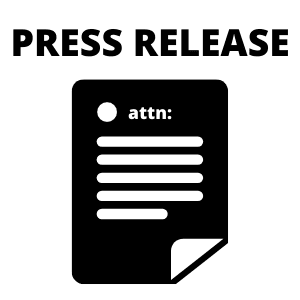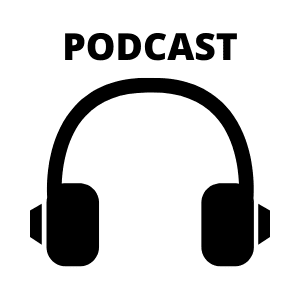- Home
- About
- Experts
- Issues
- Projects
- CNAPS (Center for North American Prosperity and Security)
- The Promised Land
- Voices that Inspire: The Macdonald-Laurier Vancouver Speaker Series
- Dragon at the Door
- Canada on top of the world
- Justice Report Card
- The Great Energy Crisis
- DisInfoWatch.org
- Double Trouble
- Digital Policy & Connectivity
- Managing Indigenous Prosperity
- Defending The Marketplace of Ideas
- Reforming the University
- Past Projects
- Canada and the Indo-Pacific Initiative
- The Transatlantic Program
- COVID Misery Index
- Speak for Ourselves
- The Eavesdropping Dragon: Huawei
- Talkin’ in the Free World with Mariam Memarsadeghi
- An Intellectual Property Strategy for Canada
- Munk Senior Fellows
- A Mandate for Canada
- Confederation Series
- Fiscal Reform
- The Canadian Century project
- Fixing Canadian health care
- Internal trade
- From a mandate for change
- Size of government in Canada
- Straight Talk
- Labour Market Report
- Leading Economic Indicator
- Centre for Advancing Canada’s Interests Abroad
- Indigenous Prosperity at a Crossroads
- Events
- Latest News
- Inside Policy
- Libraries
- Home
- About
- Experts
- Issues
- Projects
- CNAPS (Center for North American Prosperity and Security)
- The Promised Land
- Voices that Inspire: The Macdonald-Laurier Vancouver Speaker Series
- Dragon at the Door
- Canada on top of the world
- Justice Report Card
- The Great Energy Crisis
- DisInfoWatch.org
- Double Trouble
- Digital Policy & Connectivity
- Managing Indigenous Prosperity
- Defending The Marketplace of Ideas
- Reforming the University
- Past Projects
- Canada and the Indo-Pacific Initiative
- The Transatlantic Program
- COVID Misery Index
- Speak for Ourselves
- The Eavesdropping Dragon: Huawei
- Talkin’ in the Free World with Mariam Memarsadeghi
- An Intellectual Property Strategy for Canada
- Munk Senior Fellows
- A Mandate for Canada
- Confederation Series
- Fiscal Reform
- The Canadian Century project
- Fixing Canadian health care
- Internal trade
- From a mandate for change
- Size of government in Canada
- Straight Talk
- Labour Market Report
- Leading Economic Indicator
- Centre for Advancing Canada’s Interests Abroad
- Indigenous Prosperity at a Crossroads
- Events
- Latest News
- Inside Policy
- Libraries
Beyond Lockdown: Canadians can have both health and prosperity
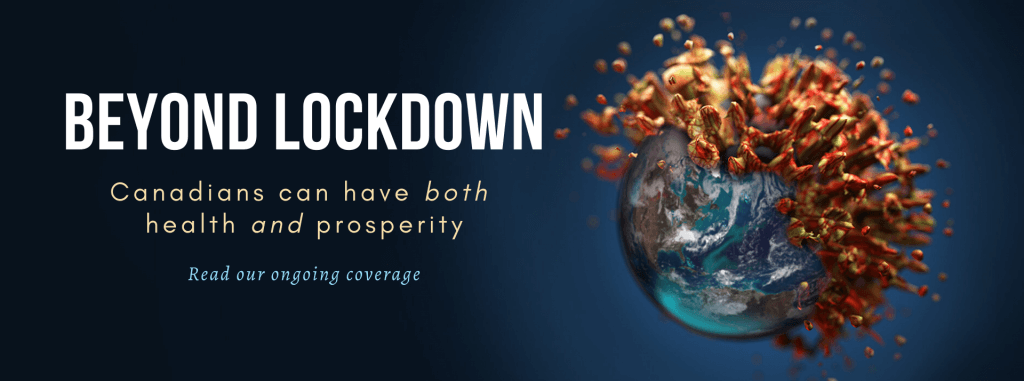
Since the beginning of the COVID-19 crisis, the Macdonald-Laurier Institute has warned that governments will need to think beyond the lockdown and consider the second and third-order consequences of their heavy-handed anti-pandemic measures. Check out MLI’s continuing coverage on COVID-19 which explains why the right policy response to this crisis balances the interests of health, prosperity, well-being, and more.
Since the beginning of the COVID-19 outbreak, Canadians have been presented with a stark choice – either selflessly shut down the economy to save lives or selfishly worry about the economy and condemn thousands to a vicious illness.
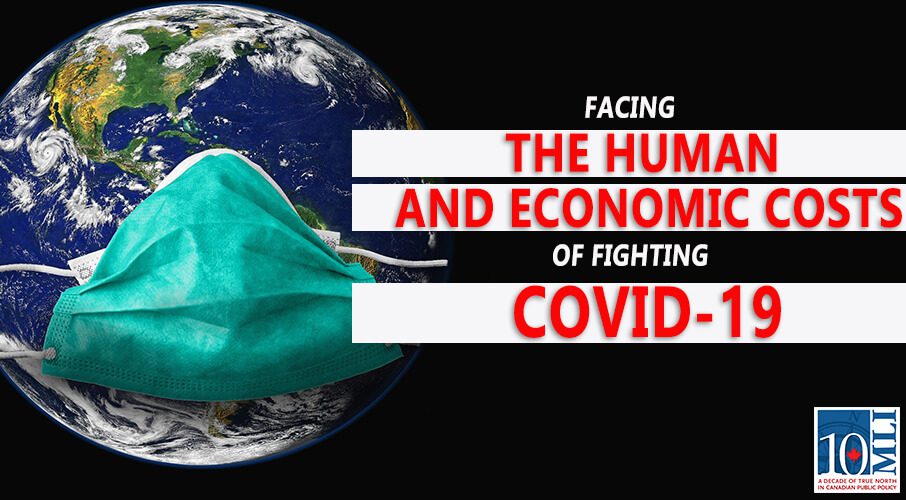
Yet, as MLI’s experts have been arguing from the outset, the alleged choice we face is not just a stark one, but a deeply misleading and false one. The lockdown was likely necessary, given the position Canada was in, and was justified because it served two main purposes. First, to “flatten the curve,” thus spreading over time the number of cases of inevitable illness so they would not overwhelm the health care system. Second, the lockdown was to buy us time to build sufficient testing and protective capacity to allow us to return to something like “normal” at the earliest possible moment.
What seems clear by now is that the lockdown did contribute to flattening the curve, but the measures employed were disproportionate to the objective. Moreover, flattening the curve was not without significant cost to our well-being, whether from the health or the economic point of view.
As for the economic cost, it has been nothing less than the deepest and most rapid loss of jobs, savings and income in the history of Canada. As MLI’s Philip Cross has pointed out, the topline job loss numbers we’ve seen so far only scratch the surface. If one includes those unable to work due to lockdown measures and those who have given up looking for work due to the crisis, the unemployment rate would have been 23 percent in March, “more in line with Statcan’s preliminary estimate that March GDP plunged nine per cent.” Estimates of the federal deficit resulting from COVID-19 range up to $400-billion. Cross’s Leading Economic Indicator, which had previously predicted sluggish growth over the early part of 2020, shows the economy is now in freefall.
Equally importantly, the lockdown response has in fact been very damaging to Canadians’ health: illnesses and conditions not related to COVID-19 have gone untreated or undiagnosed, including leading killers such as cancer and heart disease; mental illness issues have become exacerbated on a major scale; Canadians have died of heart attacks and other conditions for fear of visiting emergency wards despite the fact that most have capacity. Other social issues with a clear connection to health have also been exacerbated, including increases in domestic abuse and crime, and troubling worries about a potential suicide epidemic.
 Despite all this, judging by the lack of preparedness for the necessary phase two of our recovery efforts, the lockdown has also been largely squandered. Personal protective equipment remains in short supply and we are struggling to get needed testing capacity up to the levels required to begin a phased return to work, yet we seem to have no difficulties spending hundreds of billions of dollars of borrowed money to compensate people for not being able to work when proper measures would make work possible for many now idled.
Despite all this, judging by the lack of preparedness for the necessary phase two of our recovery efforts, the lockdown has also been largely squandered. Personal protective equipment remains in short supply and we are struggling to get needed testing capacity up to the levels required to begin a phased return to work, yet we seem to have no difficulties spending hundreds of billions of dollars of borrowed money to compensate people for not being able to work when proper measures would make work possible for many now idled.
Now Ottawa seems to be shifting the goalposts. The rationale for the lockdown seems to have morphed subtly from managing the outbreak by “flattening the curve” to preventing the illness from infecting Canadians in the first place, pushing the timeline for a return to some economic activity into the summer and a return to “normal” a year or more into the distance when a vaccine is available. It’s an impossible goal that is being pursued at an almost incalculably large cost to the well-being of Canadians in exchange for a largely illusory benefit.
Even as provinces such as Quebec, Alberta and BC push to reopen, the Prime Minister hesitates. Ottawa needs to do more to support the provinces in their efforts, not get in their way.
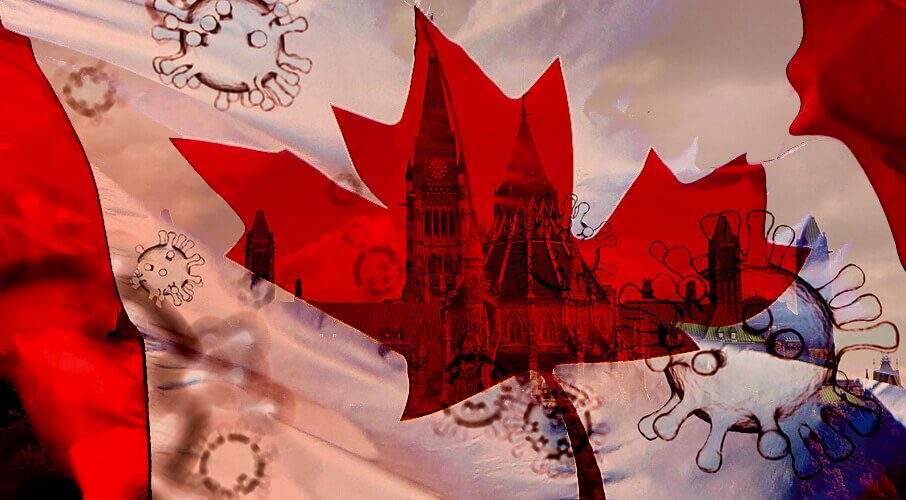
“More” does not mean more vast government programmes such as those that have been created on the fly to “tide people over” as a consequence of the government-imposed lockdown. While these have their merits in the very short term, the result is that we are imposing huge costs on ourselves and future generations with spending that is a very poor substitute for Canadians being able to work and provide for themselves and their families through their own efforts and energy. We don’t work only to earn money but because of the dignity of work and its affirmation of our worth and our contribution to society.
We can and must do better. It is the responsibility of our leaders to defend both the health and prosperity of Canadians. These goals are not in conflict but reinforce one another. The path forward does not lie in politicians deferring to experts. Understanding this will give our leaders the courage to lead us in a better direction.


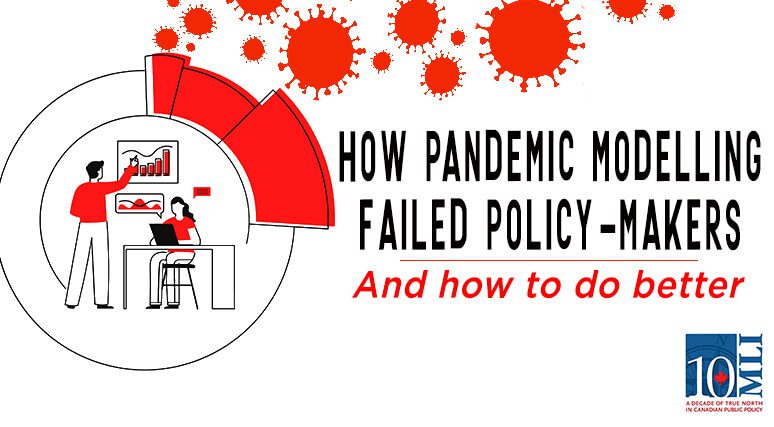



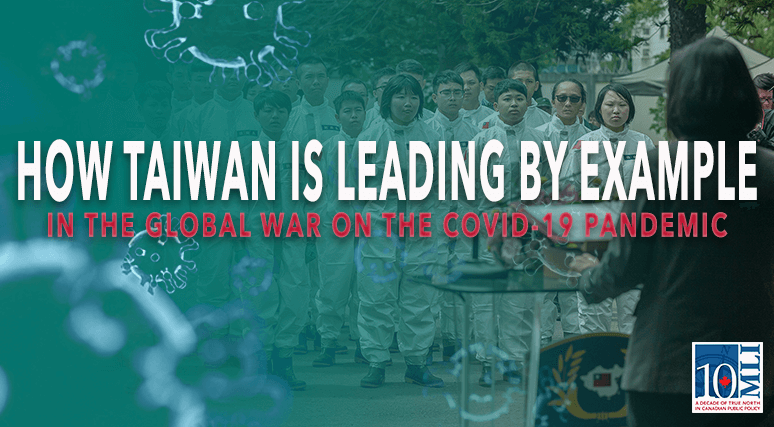





MLI Expert Findings on COVID-19
 #1. While the lockdown may have been necessary to protect the health care system and Canadian lives, a bit of foresight on the part of our policy-makers would have put us in a much stronger position. In the cover story in our COVID-19 edition of Inside Policy, Shawn Whatley looks at the government’s sluggish initial response while alarm bells should have been ringing, and continued issues such as a lack of testing capacity that has compromised the public health response, and delayed programs that could be returning people to work. As well, J. Michael Cole explores the lessons that Canada can learn from Taiwan, which got ahead of the virus early and currently has the outbreak under control while work and school go on.
#1. While the lockdown may have been necessary to protect the health care system and Canadian lives, a bit of foresight on the part of our policy-makers would have put us in a much stronger position. In the cover story in our COVID-19 edition of Inside Policy, Shawn Whatley looks at the government’s sluggish initial response while alarm bells should have been ringing, and continued issues such as a lack of testing capacity that has compromised the public health response, and delayed programs that could be returning people to work. As well, J. Michael Cole explores the lessons that Canada can learn from Taiwan, which got ahead of the virus early and currently has the outbreak under control while work and school go on.
#2. As Cole, Whatley and others explain, Canadians need to hear from their leaders that there is a plan to develop a sustainable public health regime that moves us past extreme lockdown measures and toward some semblance of normal life. Our contributors Brian Ferguson, Philip Cross and Rob Wildeboer have laid out the terrible economic and human costs of a prolonged lockdown.
 To learn more about the spread of COVID-19 in Canada and to explore the breakdown of data related to the epidemic, check out this interactive module by Petr Baranovskiy.
To learn more about the spread of COVID-19 in Canada and to explore the breakdown of data related to the epidemic, check out this interactive module by Petr Baranovskiy.
#3. A little China skepticism is the best COVID-19 prophylactic. According to Cole, one of Taiwan’s keys to success was using its own intelligence on the outbreak in China rather than relying on Chinese propaganda or World Health Organization pronouncements. Whatley also points out how Canada sent tonnes of precious medical protection equipment to China when we should have been preparing for the worst at home. Cole has also penned a strong condemnation of the World Health Organization and other UN agencies’ co-option by China which has badly hindered the global response. And the publication by MLI of an open letter signed by more than 100 China experts, political leaders, human rights scholars, global affairs experts and others has generated a huge response.
#4. We need to stay wary as China, Russia and others seek to gain advantage. As Scott Simon writes, Chinese military aggression and strategic manoeuvring is ramping up under cover of the pandemic, and Jonathan Berkshire Miller warns of the danger of succumbing to China’s self-serving account of its role in the crisis. Moreover, as Shuvaloy Majumdar, Kaveh Shahrooz and Marcus Kolga explain, with authoritarian regimes seeking to leverage this crisis to their advantage, Canada will need to work with its allies to diversify Western medical supply chains away from regimes like China.
#5. The economic response needs to be huge, decisive, and targeted, and it must leverage the private sector. Economists Jack Mintz and Philip Cross lay out principles for an effective response and explain the failure of the usual stimulus measures. Ken Coates says the usual paternalistic approaches to funding Indigenous communities won’t help them in this crisis.
#6. Some good news has emerged. According to Chris Sands, the closure of the Canada-US border for non-essential traffic was done the right way, and Adam MacDonald and Carter Vance look to the positive role played by the Canadian military.
In these dark times, Canadians need the best policy thinking in the most timely and effective manner, and with this magazine we continue that effort. Stay safe, and look for more of our work on COVID-19 in the coming days and weeks at macdonaldlaurier.ca
MLI’s Thought Leadership on COVID-19
Inside Policy: Beyond Lockdown – Helping Canada’s Economy Recover from the COVID Emergency
Author(s): Macdonald-Laurier InstituteLink:https://macdonaldlaurier.ca/inside-policy-beyond-lockdown/
“Why Canada needs a functioning Parliament: Christian Leuprecht on Afternoons with Rob Breakenridge” is locked Why Canada needs a functioning Parliament: Christian Leuprecht on Afternoons with Rob Breakenridge
Author(s): Christian LeuprechtLink:https://macdonaldlaurier.ca/why-canada-needs-functioning-parliament/
Webinar Panel Video: Fighting the Spread of Foreign Disinformation
Author(s): Macdonald-Laurier InstituteLink:https://macdonaldlaurier.ca/fighting-spread-foreign-disinformation/
The Charter’s forgotten fundamental freedoms: Brian Bird, Dwight Newman, & Derek Ross in Policy Options
Author(s): Brian Bird, Dwight Newman, & Derek RossLink:https://macdonaldlaurier.ca/charters-forgotten-fundamental-freedoms/
Principles for getting Canada back to work and prosperity: New MLI paper by Mintz, Coates, Cross and Savoie
Author(s): Jack Mintz, Ken Coates, Philip Cross, and Donald SavoieLink:https://macdonaldlaurier.ca/principles-getting-canada-back-work-prosperity-new-mli-paper-mintz-coates-cross-savoie/
The Trouble South of Us: Elliot Tepper on The Bill Kelly Show
Author(s): The Bill Kelly ShowLink:https://macdonaldlaurier.ca/elliot-tepper-bill-kelly-show/
“It’s time for a closer look at the Canada-India supply chain: Vijay Sappani in the Toronto Sun” is locked It’s time for a closer look at the Canada-India supply chain: Vijay Sappani in the Toronto Sun
Author(s): Vijay SappaniLink:https://macdonaldlaurier.ca/a-closer-look-at-the-canada-india-supply-chain/
China must be held to account for its illegal COVID-19 coverup: Errol Patrick Mendes, Marcus Kolga and Sarah Teich in Maclean’s
Author(s): Errol Patrick Mendes, Marcus Kolga and Sarah TeichLink:https://macdonaldlaurier.ca/china-violation-international-health-regulations-now-errol-patrick-mendes-marcus-kolga-sarah-teich-macleans/
“To Avoid Catastrophe, Our Leaders Need to Make Hard Choices Based on What We Know Now: MLI Report by Brian Ferguson” is locked To Avoid Catastrophe, Our Leaders Need to Make Hard Choices Based on What We Know Now: MLI Report by Brian Ferguson
Author(s): Brian FergusonLink:https://macdonaldlaurier.ca/leaders-need-make-hard-choices/
COVID-19 ‘infodemic’ is putting lives at risk: Marcus Kolga and Kate Rowswell in The Star
Author(s): Marcus Kolga and Kate RowswellLink:https://macdonaldlaurier.ca/covid-19-infodemic-putting-lives/
The Communist Party’s rule by fear endangers Chinese citizens—and the world
Author(s): Macdonald-Laurier Institute, European Values, and the Henry Jackson SocietyLink:https://macdonaldlaurier.ca/communist-partys-rule-fear-endangers-chinese-citizens-world-%e5%85%b1%e4%ba%a7%e5%85%9a%e4%be%9d%e9%9d%a0%e6%81%90%e5%90%93%e4%b8%ba%e4%b8%bb%e7%9a%84%e6%94%bf/
共产党依靠恐吓为主的政治统治方式危害中国公民乃全世界
Author(s): Jack MintzLink:https://macdonaldlaurier.ca/dont-strangle-trade-mintz/
COVID-19: What Canada should *NOT* do to combat the coronavirus: Balkan Devlen in the National Post
Author(s): Marcus Kolga, Kaveh Shahrooz, and Shuvaloy MajumdarLink:https://macdonaldlaurier.ca/china-weaponized-supply-chain-marcus-kolga-kaveh-shahrooz-shuvaloy-majumdar-macleans/
COVID-19, other rare disorders and the rescue principle: Nigel Rawson and John Adams for Inside Policy
Author(s): Rob Wildeboer and Ray PenningsLink:https://macdonaldlaurier.ca/covid-19-exit-strategy/
“It’s time to talk about a COVID-19 exit strategy: Rob Wildeboer and Ray Pennings in The Hill Times” is locked It’s time to talk about a COVID-19 exit strategy: Rob Wildeboer and Ray Pennings in The Hill Times
Author(s): Rob WildeboerLink:https://macdonaldlaurier.ca/facing-human-economic-costs-fighting-covid-19-new-mli-commentary/
Inside Policy: COVID-19 – How Canada Can Meet This Global Challenge
Author(s): Jonathan Berkshire MillerLink:https://macdonaldlaurier.ca/propaganda-behind-chinas-disinformation/
How to really help Canada’s Indigenous peoples in a time of crisis: Ken Coates for Inside Policy
Author(s): Macdonald-Laurier InstituteLink:https://macdonaldlaurier.ca/ep-46-philosophy-pandemic/
Highlights
Canada, we still need a real COVID inquiry: Kevin Bardosh in the Western Standard
This article originally appeared in the Western Standard. By Kevin Bardosh, January 29, 2024 Nearly four years after the government...
Post-pandemic – Canada desperately needs an impartial COVID-19 inquiry: Kevin Bardosh
By Kevin Bardosh January 16, 2024 PDF of Commentary Nearly four years after the Canadian government first imposed unprecedented Covid-19...
WHO health treaty a convenient cover for more government overreach: Bruce Pardy in the National Post
This article originally appeared in the National Post. By Bruce Pardy, January 9, 2023 Last September, the CBC ran a hit piece on...
The Rouleau Commission’s recommendations – Laundering the government’s agenda for censorship and expanded emergency powers: Ryan Alford
By Ryan Alford October 12, 2023 PDF of commentary On August 31, Minister of Public Safety Dominic LeBlanc issued a...
Covid-19, the test bioethics failed: Tom Koch for Inside Policy
By Tom Koch, September 21, 2023 The recent pandemic highlighted the limits of healthcare systems in Canada and around the...
This flu season, remember Sweden’s no-mask pandemic success: Shawn Whatley in the National Post
This article originally appeared in the National Post. By Shawn Whatley, September 11, 2023 New COVID variants, cooler weather and...
‘Big Tobacco’ COVID-19 vaccine: What were the Liberals thinking? Nigel Rawson and John Adams in the Financial Post
This article originally appeared in the Financial Post. By Nigel Rawson and John Adams, April 22, 2022 After being late to...
COVID should make Canadians more skeptical of wealth taxes: Philip Cross in the Financial Post
This article originally appeared in the Financial Post. Below is an excerpt from the article, which can be read in...
The challenges facing Canada in the post-COVID era
OTTAWA, ON (March 2, 2022): Even as Canadians begin to emerge from public health restrictions across the country, we must...
Don’t make the unvaxxed scapegoats for hospital overcrowding: Alanna Golden and Shawn Whatley
In 2019, Ontario tied with Mexico for the lowest number of acute care beds per capita in the world, writes...
Newsletter Signup
|
|
Thank you for Signing Up |

Macdonald-Laurier Institute
323 Chapel Street, Suite #300
Ottawa, Ontario, K1N 7Z2 Canada
613.482.8327
Support Us
Support the Macdonald-Laurier Institute to help ensure that Canada is one of the best governed countries in the world. Click below to learn more or become a sponsor.
© 2023 Macdonald-Laurier Institute. All Rights reserved.






